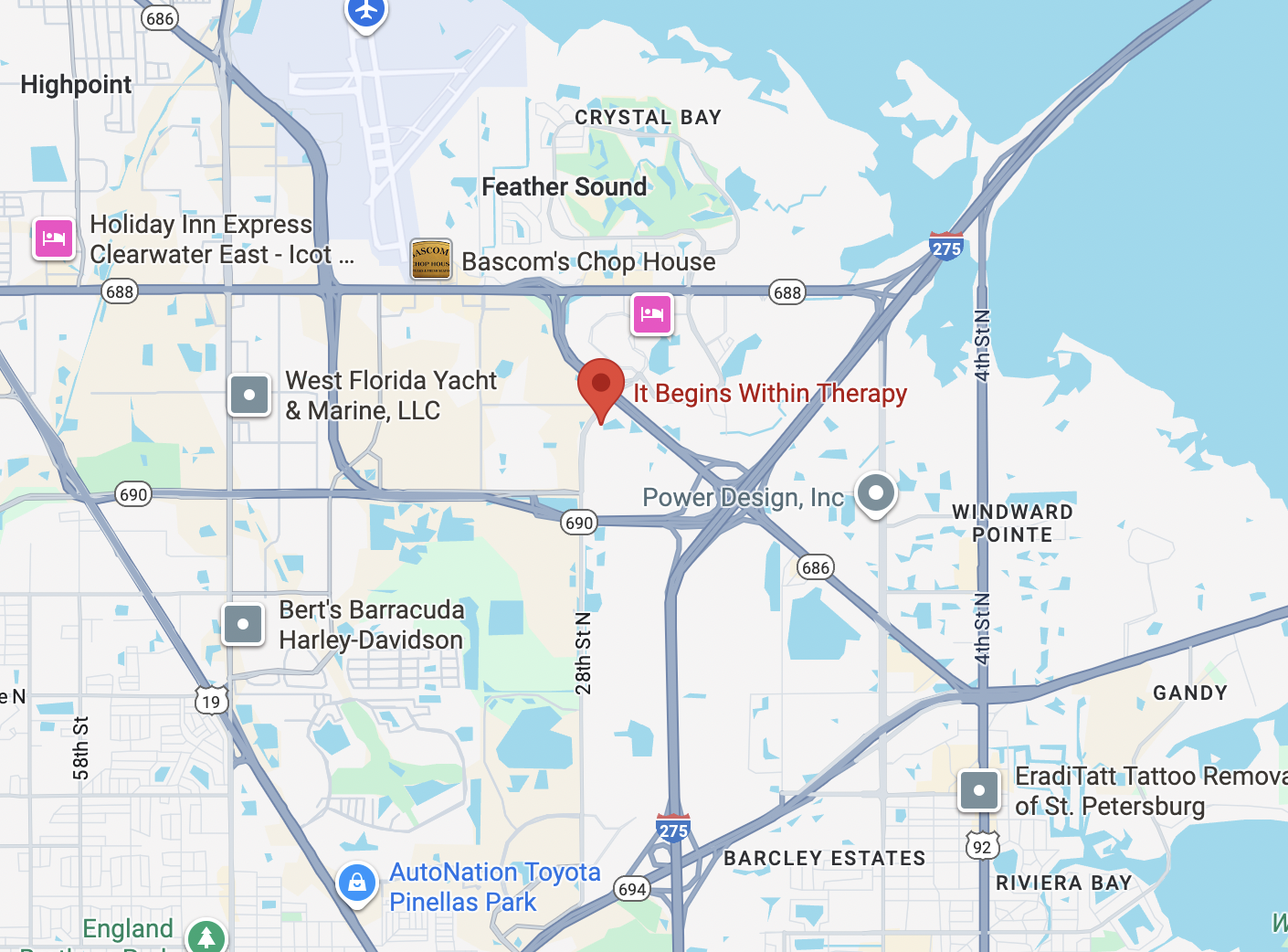Services
Grief Counseling in Tampa & St. Petersburg to Help You Heal
Finding support after loss can be overwhelming, which is why our Tampa and St. Petersburg grief counselors provide a safe, compassionate space for healing. Whether you're dealing with the loss of a loved one, a relationship ending, or any major life transition, we're here to help you navigate this challenging time.
What is Grief?
Grief is a natural response to loss, whether it’s the passing of someone you love or the absence of something that once felt grounding and familiar. It can come in many forms that vary from sadness, anxiety, numbness, exhaustion, and even anger. Sometimes it’s loud and overwhelming, other times it hides quietly in the background. Grief doesn’t follow a timeline or always make sense, and that unpredictability can feel isolating. Whether your loss happened recently or years ago, your grief is valid, and you don’t have to face it alone.
Specialized Grief Counseling
Grief can stem from a wide range of life experiences, not just death. At It Begins Within, we provide grief counseling tailored to the nature of your loss and how it’s affecting your life today. Our therapists in Tampa and St. Petersburg are trained to work with both common and complex grief responses related to:
Death of a Loved One — Spouse, parent, sibling, friend, or child
Pregnancy & Infant Loss — Miscarriage, stillbirth, or complicated reproductive grief
Divorce or Relationship Loss — Mourning the end of long-term emotional or family bonds
Pet Loss — Validating the deep grief that can follow the death of a beloved companion animal
Job Loss, Retirement, or Life Transitions — Grieving identity, purpose, and stability
Health-Related Grief — Chronic illness, new diagnoses, or caregiving exhaustion
Traumatic or Unresolved Loss — Disenfranchised grief, sudden death, or ongoing emotional pain
Anticipatory Grief — Facing loss that hasn’t happened yet but deeply impacts the present
Each of these experiences can leave you feeling untethered (emotionally, physically, or spiritually). Our licensed clinicians create space to explore your grief on your terms, integrating personalized approaches that gently help restore clarity, self-compassion, and connection.
Our Approach to Grief Therapy
At It Begins Within Healing Center, we believe grief deserves space—not solutions. There’s no one “right” way to grieve, and our role isn’t to fix or rush your experience. Instead, we meet you exactly where you are, guiding you through the healing process with care, curiosity, and respect.
“Grief is not something to ‘get over’—it’s something we learn to carry. At IBWHC, we don’t pathologize pain. We honor it, hold space for it, and help you find your way through it with safety, empathy, and dignity.”
— Dr. Mary Perleoni, LMHC, Founder & Clinical Director
Our team uses a trauma-informed lens in everything we do. That means we prioritize emotional safety, choice, and collaboration—especially when grief is tied to overwhelming or unresolved experiences. Each session is tailored to your specific needs and comfort level.
Depending on what feels right for you, your therapist may incorporate:
Person-Centered Therapy gives you space to feel seen, heard, and supported (without pressure or judgment)
Trauma-Focused CBT to process intense thought patterns and emotions
ART or EMDR therapy can address grief that’s blended with traumatic memories, and can help your body and brain release the tension they’re holding.
Play Therapy is a specialized approach children navigating loss
Faith-Integrated Therapy for those seeking to explore grief through a spiritual lens
Grief is never one-size-fits-all, and neither is our support. Whether you need weekly emotional space, skills-based tools, or simply one calm voice in a tough season, we are here for you in a way that meets you where you are.
When you're ready, we're here.
Schedule a free 15-minute consultation with one of our grief counselors in Tampa or St. Petersburg to see if therapy feels like the right next step for you.
What Happens in Grief Counseling?
If you’re considering grief counseling, it’s normal to wonder what the process looks like—or to worry that you won’t know what to say. At It Begins Within Healing Center, we’re here to guide you gently from the very first session.
What to Expect in Your First Session
Your first grief therapy session is all about creating safety and connection. You don’t need to prepare anything or explain your whole story. Your therapist will meet you with empathy and curiosity, ask a few gentle questions, and help you feel at ease. You’ll have the space to talk about your experience—or stay quiet—without judgment.
How Grief Counseling Works Over Time
Grief therapy is highly individual. Some clients meet weekly to talk through loss and emotions. Others work with their therapist on managing anxiety, sleep, or numbness, or to process feelings tied to more traumatic or complex grief.
You might explore topics such as:
How your loss shows up emotionally, physically, or relationally
Your changing sense of identity or meaning
Guilt, anger, or unresolved parts of grief
Practical coping tools for waves of emotion or daily overwhelm
Together, you and your therapist will decide what support feels most meaningful. There’s no one way to move through grief—and we never force a timeline.
Where and How You’ll Meet
Sessions are available in person at our Tampa or St. Petersburg offices, or online from anywhere in Florida. Appointments are paced around your comfort level and needs—weekly, bi-weekly, short-term, or ongoing.
Meet Our Grief Counselors Near You in St. Petersburg & Tampa
Signs I Should Seek a Grief Counselor
Recognizing the signs that it may be time to seek professional help is crucial for addressing the emotional, mental, and physical impacts of loss. Here are some key indicators:
Prolonged Grief
Difficulty Functioning
Overwhelming Emotions
Physical Symptoms
Avoidance
Isolation
Risky Behaviors
Lack of Closure
Limited Support System
Grief Counseling in Tampa and Beyond
At It Begins Within Healing Center in Tampa, Florida, we serve families and individuals across Tampa, St. Petersburg, and the greater Tampa Bay area, where the need for trusted grief counseling continues to grow. This is especially true for those navigating the challenges of loss and bereavement.
Facts about Grief
A Pew Research Center survey found that 68% of adults have experienced the death of a close friend or relative in the past five years. Pew Research Center.
A study published in BMC Psychiatry found bereaved individuals have over double the risk of developing depression compared to non-bereaved individuals. BMC Psychiatry.
These numbers reflect what we see regularly in our Tampa practice. Loss can deeply impact mental health, relationships, and overall quality of life. With compassionate and effective grief counseling, individuals can find ways to heal and move forward. Whether you’re coping with the recent loss of a loved one or struggling with lingering feelings of grief, our team is here to provide the support you deserve.
Frequently Asked Questions About Grief Counseling
What is grief counseling, and how is it different from regular talk therapy?
Grief counseling focuses specifically on helping individuals process and adjust to loss—whether it’s the death of a loved one, the end of a relationship, or a major life transition. At IBWHC, our grief therapists use gentle, trauma-informed approaches to support emotional healing, identity shifts, and day-to-day coping. We also offer modalities like EMDR, CBT, and TF-CBT when deeper trauma or complex grief is involved.
What happens in a grief counseling session?
Every session is shaped around your needs. You might spend time sharing stories, processing emotions, learning coping tools, or exploring any trauma linked to your loss. In the first session, we’ll focus on building trust, understanding your experience, and defining what support would feel helpful to you—it’s okay if you’re not sure yet. Many clients say simply speaking their grief aloud brings relief.
How long does grief counseling usually take?
There’s no “set” number of sessions. Some clients benefit from 6–12 sessions focusing on immediate support, while others find ongoing therapy helpful for navigating layered or long-term grief. During your initial consultation, we’ll talk through your goals and recommend a cadence that works best for you.
Is grief therapy just for death-related losses?
Not at all. You can grieve the loss of relationships, fertility, health, faith, stability, or identity. We see clients dealing with divorce, estrangement, caregiving stress, childhood losses, and life stage transitions. If something feels like a loss to you, you’re welcome here.
Do you offer bereavement counseling near me?
Yes—we serve clients locally from Tampa and St. Petersburg through in-person sessions at our private offices. We also offer secure online grief counseling throughout Florida, so whether you're in Orlando, Sarasota, or beyond, support is just a click away. If you searched for “bereavement counseling near me,” you’ve found a safe place to begin.
Can grief counseling help if I’m feeling anxious, numb, or angry?
Definitely. Grief can show up in countless emotional and physical forms—sleep loss, irritability, panic, fogginess, exhaustion. These are all normal responses. Our therapists will help you make sense of what you’re experiencing and develop tools to move through it, not around it.
I’m nervous—I don’t know if I’m ready to talk.
That’s completely okay. You get to decide what feels safe to share and when. Our therapists will never push or pressure you. Many clients begin sessions just needing a place to sit in their grief without judgment. That’s more than enough.
Do you accept insurance?
We are a private-pay practice. This allows us to give each client our full attention and flexibility in treatment. We’re happy to provide superbills if you want to seek out-of-network reimbursement from your insurance provider.
Do you offer evening or weekend sessions?
Yes. We offer flexible daytime, evening, and limited Saturday availability—both in-person and online. Let us know your preferences during your free consultation, and we’ll do our best to match you with a therapist whose schedule aligns.
Grief Counseling and Bereavement Therapy Near You in Florida
Grief Counseling in St. Petersburg, FL
Our St. Petersburg grief counseling office provides gentle, professional support for adults and families navigating loss, trauma, or life transitions. Serving Clearwater, Largo, Gulfport, and Treasure Island, our licensed therapists specialize in bereavement counseling near me, grief and trauma counseling near me, and complicated grief therapy—all designed to help you heal and reconnect with life.
Grief Counseling in Tampa, FL
At our Tampa grief counseling center, located near Westshore, we help individuals and families throughout Hillsborough County—including Hyde Park, Carrollwood, and South Tampa—cope with grief, loss, and emotional overwhelm. Our licensed clinicians provide individual grief therapy near me, bereavement counseling, and grief and trauma therapy that blend clinical expertise with deep compassion.
In-Person Grief Counseling in Sarasota, FL
Our Sarasota grief counseling office provides in-person grief therapy near me for clients from Lakewood Ranch, Palmer Ranch, Siesta Key, and Venice. Whether you’re facing complicated grief, bereavement counseling near me, or need grief and trauma counseling near me, our experienced Sarasota therapists create a warm, grounded space where you can process emotions and rediscover peace.

Grieving Counselors Near Me in Florida
We offer comprehensive mental health services for grief and are dedicated to the best outcome for our clients. Please reach out to us today to book a session with one of our skilled grief therapists.















